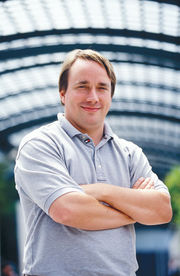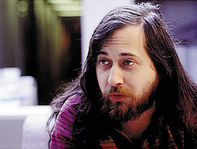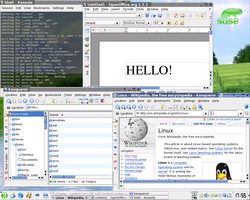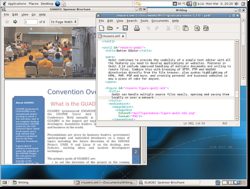|
LINUX
|
|
|
HOME | BIOLOGY | FILMS | GEOGRAPHY | HISTORY | INDEX | MUSIC | THE BOAT | SOLAR BOATS | SPONSORS |
|
|
Linux (also known as GNU/Linux) is a computer operating system. It is one of the most prominent examples of free software and of open source development; unlike proprietary operating systems such as Windows or Macintosh, all of its underlying source code is available to the public for anyone to freely use, modify, improve, and redistribute.
Initially, Linux was primarily developed and used by individual enthusiasts. Since then, Linux has gained the support of major corporations such as IBM, Sun Microsystems, Hewlett-Packard, and Novell for use in servers and is gaining popularity in the desktop market. Proponents and analysts attribute this success to its vendor independence (the opposite of vendor lock-in), low cost, security, and reliability.
Linus Torvalds, creator of the Linux kernel History
In 1983, Richard Stallman founded the GNU Project. The goal of GNU was to develop a complete Unix-like operating system composed entirely of free software. By the beginning of the 1990s, GNU had produced or collected most of the necessary components of this system — libraries, compilers, text editors, a Unix-like shell — except for the lowest level, the kernel. The GNU project began developing a kernel, the Hurd, in 1990, based on the Mach microkernel. This Mach-based design subsequently proved difficult, however, and development proceeded slowly.
Meanwhile, in 1991, another kernel was begun as a hobby by Finnish university student Linus Torvalds while attending the University of Helsinki. Torvalds originally used Minix, a simplified Unix-like system written by Andrew Tanenbaum for teaching operating system design. However, Tanenbaum did not permit others to extend his operating system, leading Torvalds to develop a replacement for Minix.
Originally Torvalds was going to call his kernel Freax for "free" and with the often-used X in the names of Unix-like systems. The name "Linux" was coined by Ari Lemmke, who administered an FTP server belonging to the Finnish University Network; he invented the name Linux for the directory from which Torvalds' project was first available for download.
At first a computer running Minix was necessary in order to configure and install Linux. Initial versions of Linux also required another operating system to be present in order to boot from a hard disk, but soon there were independent loaders such as LILO. The Linux system quickly surpassed Minix in functionality; Torvalds and other early Linux kernel developers adapted their work for the GNU components and user-space programs to create a complete, fully functional, and free operating system.
Today, Torvalds continues to direct the development of the kernel, while other subsystems such as the GNU components are developed separately. The task of combining and distributing these components with additional application software is performed by third-party vendors in the form of Linux distributions.
Portability
The Linux kernel was originally envisioned to be used on Intel 80386-based machines. While not originally intended to be portable to other architectures, Linux is now one of the most widely ported operating systems in the world, running on a diverse range of systems from the iPAQ to the IBM System z9. Specialised distributions exist for less mainstream architectures.
In contrast to the kernel itself, many of the other system components were readily portable, in some cases having been ported from other architectures in the first place. Licensing
The Linux kernel and most of the GNU components are licensed under the GNU General Public License. The GPL requires that all source code modifications and derived works also be licensed under the GPL, and is sometimes referred to as a "share and share-alike" (or copyleft) license. In 1997, Linus Torvalds stated, "Making Linux GPL'd was definitely the best thing I ever did." Other subsystems use other licenses, although all of them share the property of being free and open source; for example, several libraries use the LGPL (a more permissive variant of the GPL), and the X Window System uses the non-copyleft MIT License.
The Linux trademark is owned by Linus Torvalds, registered for "Computer operating system software to facilitate computer use and operation." The licensing of the trademark is now handled by the Linux Mark Institute. LMI has also sought to enforce the Linux trademark in countries other than the U.S. In September 2005, Intellectual Property Australia rejected an application to trademark Linux in Australia. Torvalds has stated that he only trademarked the name to prevent someone else doing so, but was bound in 2005 by United States trademark law to take active measures to enforce the trademark. As a result, the LMI sent out a number of letters to distribution vendors requesting that a fee be paid for the use of the name, and a number of companies complied. Pronunciation
In 1992, Torvalds explained (IPA pronunciations added to quote in braces):
In English-speaking regions Linux is most commonly pronounced either to rhyme with minix [ˈlɪnəks], or to sound like lie nix [ˈlaɪnəks]. The first pronunciation is considered more correct, while the second has become popular for sounding more natural as in English the short /ɪ/ sound is different from Torvalds' phonemically Finland-Swedish pronunciation.
Torvalds says that the way he pronounces "Linux" has changed since moving to the U.S. but that he actually doesn't care how others pronounce it so long as their pronunciation can't be confused with the name of another operating system.
Richard Stallman - founder of the GNU project for a free operating system
Linux and the GNU Project
Because the GNU libraries and programs which form an essential part of all Linux distributions stem from a free operating system project predating the Linux kernel, the Free Software Foundation ask that the combined system be referred to as "GNU/Linux" or "a Linux-based GNU system". Linus Torvalds has said that he finds calling Linux in general GNU/Linux "just ridiculous". Some distributions do use this name — notably Debian GNU/Linux — while most people simply refer to the system as Linux. The distinction between Torvalds' kernel and entire systems that built upon it is a source of confusion to many newcomers, and the naming remains controversial. Development efforts
More Than a Gigabuck: Estimating GNU/Linux's Size, a study of Red Hat Linux 7.1, found that this particular distribution contained 30 million source lines of code (SLOC). The Linux kernel contained 2.4 million lines of code, or 8% of the total. Using the Constructive Cost Model (COCOMO), the study estimated that this distribution required about eight thousand person-years of development time. Had all this software been developed by conventional proprietary means, it would have cost 1.08 billion dollars (year 2000 U.S. dollars) to develop in the United States. Slightly over half of the code in that distribution was licensed under the GPL.
In a later study, Counting potatoes: the size of Debian 2.2, the same analysis was performed for Debian GNU/Linux version 2.2. This distribution contained over fifty-five million source lines of code, and the study estimated that it would have cost 1.9 billion dollars (year 2000 U.S. dollars) to develop by conventional proprietary means.
A KDE Desktop
Applications
Linux's low cost, flexibility and Unix background make it suitable for a wide range of applications.
Linux is the cornerstone of the so-called LAMP server-software combination (Linux, Apache, MySQL, Perl/PHP/Python) which has achieved widespread popularity among Web developers, making it one of the most common platforms on the Web. A prominent example of this software combination in use is MediaWiki — the software primarily written for Wikipedia.
The video game industry will see Linux more accessible to gamers with the 2006 launch of the Sony PlayStation 3 video game console which will run Linux out of the box. Sony has previously released a PS2 Linux kit for their PlayStation 2 video game console. Developers like Atari, id Software, and the US Army regularly release titles to the Linux desktop.
Linux is also often used in embedded systems. Its low cost makes it particularly useful in set-top boxes and for hand-held devices such as the Simputer, a computer aimed mainly at low-income populations in developing nations. In mobile phones, Linux has become a major competitor to the proprietary Symbian OS software and in handheld devices, it is an alternative to the Windows CE and Palm OS operating systems (PalmSource has stated that future versions of Palm OS Cobalt will be built as a layer on top of the Linux kernel). The popular TiVo digital video recorder uses a customized version of Linux. A large number of network firewalls and routers use Linux internally, taking advantage of the advanced firewalling and routing capabilities built in the kernel itself. The TomTom satellite navigation system uses an embedded version of the Linux kernel. Linux is also expanding into telecommunications equipment through efforts such as Carrier Grade Linux.
Linux is increasingly common as an operating system for supercomputers. In the November 2005 TOP500 list of supercomputers, the 2 fastest supercomputers in the world run Linux. Of the 500 systems, 73.2% run some version of Linux, including 7 of the top 10. Distributions
Linux is predominantly used as part of a Linux distribution (commonly called a 'distro'). These are compiled by individuals, loose-knit teams, and various professional organizations. They commonly include additional system software and applications, an installer system to ease initial system setup and simplified management of component updates. Distributions are created for many different purposes, including localization, architecture support, real-time applications, and embedded systems, and many deliberately include only free software. Over 450 distributions are available.
A typical general-purpose distribution includes the Linux kernel, some GNU libraries and tools, command-line shells, the graphical X Window System and an accompanying desktop environment such as KDE or GNOME, together with thousands of application software packages, from office suites to compilers, text editors, and scientific tools.
|
|
We specialise in the design and manufacture of electronic assemblies, a few examples of which are:
Qtronics can be contacted at the telephone numbers or email addresses below:
Office: +44 (0) 161 408 0917
Mob.: +44 (0) 7725615079 FAX: 0033321817086
Emaill: sales@qtronics.net or tech@qtronics.net
|
Installation
In the past, difficulty of installation was a barrier to wide adoption of Linux-based desktop systems. Many distributions are now at least as easy to install as a comparable version of Windows. It is unnecessary to file license numbers and enter them during installation and it is not normally necessary to install drivers after installing Linux, as most hardware is supported out of the box.
As with servers, personal computers that come with Linux already installed are available from vendors including Hewlett-Packard and Dell.
The most common method of installing Linux on a personal computer is by booting from a CD that contains the installation program and installable software. Such a CD can be burned from a downloaded ISO image, purchased alone for a low price, or can be obtained as part of a box set that may also include manuals and additional commercial software.
Alternatives include thin client installation and running directly from a LiveCD.
On embedded devices Linux is typically held in the device's firmware and may or may not be consumer-accessible.
Programming on Linux
The GNU Compiler Collection is by far the most commonly-used compiler family on Linux, providing frontends for C, C++ and Java amongst others. There are a number of IDEs available for Linux including Anjuta, KDevelop, NetBeans IDE and Eclipse, with extensible editors such as Emacs also remaining widely used. Linux is as suited to scripting languages as other Unix variants and in addition to shell programming most Linux distributions come installed with Python, Perl, PHP and Ruby.
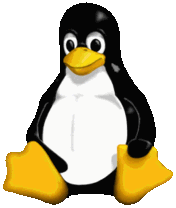
Linux logo
Support
Technical support is provided by commercial suppliers and by other Linux users, usually in online forums, newsgroups and mailing lists. Linux User Groups (LUGs) have traditionally been organised to provide local support for Linux.
The business model of commercial suppliers is generally dependent on charging for support, especially for business users. Some companies offer a special business version of their distribution which adds proprietary support packages and tools to administer higher numbers of installations or do administrative tasks more easily.
Litigation
In March 2003, the SCO Group (SCO) filed a lawsuit against IBM claiming that IBM had contributed some portions of SCO's copyrighted code to the Linux kernel in violation of IBM's license to use Unix. Additionally, SCO sent letters to a number of companies warning that their use of Linux without a license from SCO may be actionable, and claimed in the press that they would be suing individual Linux users. This controversy has involved lawsuits by SCO against Novell, DaimlerChrysler (partially dismissed in July, 2004), and AutoZone, and by Red Hat and others against SCO.
To date, no proof of SCO's claims of copied code in Linux has been provided and SCO's claims have varied widely.
References
-
Glyn Moody: Rebel Code: Linux and the Open Source Revolution, Perseus Publishing, ISBN 0-713-99520-3
-
Gedda. R. (2004). Linux breaks desktop barrier in 2004: Torvalds.
-
Mackenzie, K. (2004). Linux Torvalds Q&A.
-
More Than a Gigabuck: Estimating GNU/Linux's Size by David A. Wheeler
-
Counting potatoes: the size of Debian 2.2 by Jesús M. González-Barahona et al.
-
Why Open Source Software / Free Software (OSS/FS)? Look at the Numbers! by David A. Wheeler
-
Desktop Linux: Ready for Prime Time? by Emmett Dulaney, Redmond Magazine
-
Mandrake 8.1 easier than Win-XP by Thomas C. Greene, The Register
Footnotes
-
Burke, Steven, "Red Hat looks to boost channel sales", CRN.
-
Dennis, James (October 2000). "The Answer Gang 58" (58).
-
An audio file of Torvalds saying "Hello, this is Linus Torvalds, and I pronounce Linux as /lɪnʊks/" can be found here
-
Blau, John, "Study: Linux nears Windows XP usability", IDG News Service.
-
Why Open Source Software / Free Software (OSS/FS)? Look at the Numbers!.
External links
General
-
Linux.org - contains comprehensive information and resources about Linux.
-
Linux.com - commercial news site.
-
Linux zone of developerWorks - contains articles, tutorials, and tips to help developers with Linux application development and system administration.
-
Kernel.org - development.
Distribution related
-
Distro Quiz — a test that recommends a distribution based on the answers.
-
Linux Distribution Chooser — another distro recommendation tool
-
Linux Online — distributions and FTP sites (sortable by categories)
-
DistroWatch.com — distribution information & announcements.
A taste for adventure capitalists
Solar Cola - the healthier cola alternative
This material and any views expressed herein are provided for information purposes only and should not be construed in any way as a prospectus or offer. Please contact the company concerned for information of any business opportunity or specific program. Before investing in any business, you must obtain, read and examine thoroughly its disclosure document or offering memorandum.
This
website
is Copyright © 1999 & 2006 NJK. The bird ![]() logo and name Solar Navigator are trademarks. All rights reserved.
All other trademarks are hereby acknowledged.
Max Energy Limited is
an educational charity.
logo and name Solar Navigator are trademarks. All rights reserved.
All other trademarks are hereby acknowledged.
Max Energy Limited is
an educational charity.
AUTOMOTIVE | BLUEBIRD | ELECTRIC CARS | ELECTRIC CYCLES | SOLAR CARS
